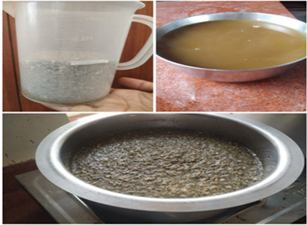Gokshura Kashaya Bladder Wash in the management of Mutrakruchra with special reference to Urinary Tract Infection : A Case Study
Keywords:
Bladder Wash, Cystitis, Gokshurakashaya, Mutrakruchra, Urinary Tract Infection.Abstract
Urinary tract infection is a common disorder accounting for 1-3% of consultation in general medical practice. Urinary tract infection is a term used to describe Acute urethritis and Cystitis caused by microorganism. In Ayurveda, the disease Mutrakruchra is mentioned in almost all classical texts with different signs, symptoms and treatment modalities, reflecting its prevalence in ancient period, which can be correlated to urinary tract infection. Acharya Sushrutha has explained the treatment of Mutrakruchra in detail by mentioning various internal medications, Anuvasana and Uttara Basti. Numerous studies are done in the management of Mutrakruchra with the internal medication. Here a preliminary attempt to study the effect of bladder wash with Gokshura Kashaya in the management of the same was taken for the study.
Downloads
References
Stanley Davidson. Kidney and urinary tract disease In: Brian Walker R, Nicki Colledge R, Stuart Ralstin H, Ian Penmsan D, editors. Davidson’s Principles & Practice of Medicine. 22nd ed. London: Elsevier publication; 2014. p.511.
Stanley Davidson. Kidney and urinary tract disease In: Brian Walker R, Nicki Colledge R, Stuart Ralstin H, Ian Penmsan D, editors. Davidson’s Principles & Practice of Medicine. 22nd ed. London: Elsevier publication; 2014. p.511.
Waites KB, Canupp KC, Roper JF, Camp SM, Chen Y. Evaluation of 3 Methods of Bladder Irrigation to Treat Bacteriuria in Persons with Neurogenic Bladder. The Journal of Spinal Cord Medicine [Internet]. 2006 Jan [cited 2021 Jul 13];29(3):217–26.
Aacharya JadavajiTrikamji editor. Susrutha, Susruthasamhitha, Uttaratantra. Ch.59,Ver.15-27.Reprint.Varanasi:Choukhambha Surbharatiprakashan, Kashi Sanskrit series 42;2019.p.793-894.
Sharma RK, BhagwanDash., editor. Charakasamhita of Agnivesh, Sutrasthana. Ch.4. Ver.11,15,16. Reprint.Varanasi: Chaukamba Sanskrit series, 2012.p.96-97.
Sharma RK, BhagwanDash., editor. Charakasamhita of Agnivesha, Sutrasthana.Ch.25, ver.40. Reprint. Varanasi: Chaukamba Sanskrit series,2012.p.425-7.
Ștefănescu R, Tero-Vescan A, Negroiu A, Aurică E, Vari C-E. A Comprehensive Review of the Phytochemical, Pharmacological, and Toxicological Properties of Tribulus terrestris L. Biomolecules [Internet]. 2020 May 12 [cited 2021 Jul 13];10(5):752.
Moussa M, Chakra MA, Papatsoris AG, Dellis A, Dabboucy B, Fares Y. Bladder irrigation with povidone‐iodine prevent recurrent urinary tract infections in neurogenic bladder patients on clean intermittent catheterization. Neurourology and Urodynamics [Internet]. 2021 Jan 21 [cited 2021 Jul 14];40(2):672–9.
Sastry J L N. DravyagunaVijnana.Vol.2. Reprint. Varanasi: Chowkamba Orientalia, Jai krishna das Ayurveda series 114; 2012. p.98-100.
Shoba Hiremath G. Panca-VidhaKasaya Kalpana.Ch.9. A text book of Bhaisajya-kalpana .7th edition reprint. Bangalore: Adiga H K L; 2015,p.102.















